Reviews
Stanley Kubrick
UK/USA, 1962
Credits
Review by Katherine Follett
Posted on 07 March 2010
Source Warner Home Video
Categories Kubrick
Is it fair to criticize a film by comparing it to the book from which it’s adapted? On the other hand, is it possible to do anything else when the book is as famous as Nabokov’s Lolita? Even the poster and tagline of Kubrick’s 1962 film assume the audience’s familiarity with the novel, teasing, “How did they ever make a movie of Lolita?” Lolita is famously considered unfilmable—but not for the scandalous reasons the tagline suggests. This is because the book is so dependent on language; almost all of the weight of the novel falls in the gap between Humbert’s written observations and the horrifying truth that seeps through his words.
But if anybody could film Lolita, or could at least make the best effort, it would be Stanley Kubrick. His ornate, formalist perfectionism is an excellent analogue to Humbert Humbert’s gilded narration. And Kubrick’s emotional coolness, his reservation in the face of dramatic action, and his ability to balance ambiguity should serve the tone and events of the book extraordinarily well. But even with all this, it cannot be said that Kubrick’s Lolita comes anywhere close to the power of Nabokov’s novel. And though it is not a failure of a film, its standing in comparison with its source material may be a fatal flaw.
Given that Nabokov’s book is so heavily dependent on Humbert’s narration and the unreliable narrator technique, the obvious choice in making the film would be to use abundant voiceover. But Kubrick uses voiceover sparingly, reserving it almost solely for exposition. That leaves Kubrick with a problem: there are two versions of the events of the novel, the one that happens in Humbert’s head, and the one the reader knows to be true. How could a narrative film depict both?
There are ways in which Kubrick plays with the gap between perception and reality. There is a quite masterful moment when Charlotte, Lolita’s mother and recently Humbert’s wife, discovers Humbert’s true desires upon reading his journal. Humbert, believing Charlotte to be upstairs, yells bald-faced lies at the ceiling while he prepares his wife a conciliatory martini. He then receives a phone call telling him that Mrs. Humbert has been struck by a car. The timing is set up so perfectly that it seems ridiculous to us, too, that Charlotte, who was last seen fleeing into her room, could have just been killed, yet she was.
There is also Peter Sellers as Claire Quilty, an all-purpose perv who eventually becomes Lolita’s abductor and Humbert’s rival and murder victim. Quilty adopts several disguises in his pursuit of Lolita, disguises Humbert does not see through until Lolita reveals them in an epilogue.1 Sellers’ masterful performance in the first scene especially raises hopes for the rest of the film, and reminds me of the blockbuster opening confrontation in Tarantino’s Inglourious Basterds. Starting us off at the chronological end of the novel, Humbert confronts Quilty about his “theft” and “abuse” of Lolita, intending to kill him. Sellers, intoxicated and wrapped toga-style in a sheet, simply refuses to take Humbert seriously, engaging him in jokes, adopting playful voices, and even lobbing ping-pong balls at him. Kubrick, Sellers, and James Mason as Humbert create tension not only because the characters are at odds, but also because the characters’ personalities are diametrically opposed. The scene is jaw-clenching, tense yet hilarious, even before we know why Humbert wants to murder Quilty.
Sellers appears several times over the course of the film, donning mannerisms, accents, and characters unbeknownst to Humbert, taunting Humbert and hinting that he knows what’s really going on. Sellers’ playfulness is such a brilliant, puncturing foil to Humbert’s stuffy pretentiousness that he easily wins us over—we can see the story through Quilty’s eyes, understanding Humbert for the awful fool he is. In a way, Sellers’ Quilty becomes the viewer’s glimpse into the “unreliable narrator” that was critical to the novel. It’s no wonder Kubrick greatly enhanced Quilty’s role from the book—most of Sellers’ scenes were a pure invention of Kubrick and his actors. But unfortunately, Quilty’s scenes are still too seldom, too arbitrary, and too dependent on coincidence to truly round out the story outside Humbert’s head. In the larger context of the movie, they do a better job showing off Sellers’ gift for accents and mimicry than they do serving narrative goals of the film. And unfortunately, seeing Sellers’ brilliance in comparison to Mason’s understated performance (see Sellers’ ease with comedy as opposed to Mason’s embarrassing slapstick encounter with a cot, or the erotic tension between Quilty and a hotel clerk in comparison to Humbert and Lolita’s awkward flirtations), it seems inevitable that the viewer wishes Sellers had been cast as Humbert. Instead, Quilty appears for brief, almost random scenes, while the rest of the film plays it straight.
So if the film cannot completely recreate the “unreliable narrator” effect, Kubrick is left with two basic choices: to depict the events of the novel as Humbert narrates them, or to depict them as the reader/viewer knows them to be. Neither is fully satisfactory. Given moral codes of the time, the second may be impossible. So whether it was Kubrick’s intention or not, in the end the film falls solidly in line with Humbert’s perceptions of events. For example, Charlotte (Shelley Winters) is from her very first scene irritating, vulgar, loud, and gauche, just as Humbert describes her. We begin to dread having to spend more time with her, much as Humbert does. Humbert’s cruelty and Charlotte’s sadness come through when he laughs at Charlotte’s written confession of love, but it isn’t long before we’re (hilariously) right back on Humbert’s side as he attempts to perform a body shot off his own chest while floating in a bubble bath in celebration of the harpy’s timely demise. Even the little voiceover that Kubrick left intact only serves to promote Humbert’s view of events. After Charlotte’s death, we’re told to “forget poor Charlotte and poor Lolita,” and the film does. We fast-forward six months in one leap, skipping over not only most of Lolita’s grief and fear after being orphaned in the care of her abuser, but also the shift in Lolita’s and Humbert’s relationship from one-time folly to full-time involvement, both as lovers and as parent and child.
And then, of course, there is Sue Lyon as Lolita. Though she performs with great spunk, she is quite simply too old to portray a “nymphet” as Nabokov intended her. This was the input of a censor, who hated to think that a film might sexualize a girl who was obviously far too young for adult sexuality. Which is, of course, the whole crux and point of the novel. Lyon’s maturity reduces the tension in the first half of the film, when we wonder if Humbert will succeed in “seducing” Lolita, because Lolita seems such a willing and capable party in it. And in the second half of the film, after Humbert takes possession of the girl, their relationship seems less abusive than by turns infuriating, frustrating, and boring: in short, only as bothersome as any sexual relationship between two adults with little in common. Even Charlotte sees Lolita as more her rival than her charge. She, like Humbert (and inevitably, the audience), sees her as a fully sexual being. So both Charlotte and Lolita are shown just as Humbert reported them—Charlotte the pathetic, overbearing fool; Lolita the sultry temptress.
The age problem is especially apparent in Lyon’s first scene, in which Lolita sits sunning herself in a bikini and a floppy hat, her curves swooping, her legs, hips, and breasts obviously post-pubescent. Sue Lyon is, bluntly, hot. There’s nothing out of the ordinary in finding her so. Without the obviously unacceptably young age of the title character, Humbert’s obsession becomes a transgression of degree rather than kind: he is no longer a pedophile, a monster, but a pretty ordinary heterosexual man who plays a bit fast and loose with the age of consent. Had the film been able to depict that Humbert was fully aware of - in fact, wholly eager about - the fact that Lolita was just a child, then the age of the actress may have disappeared when we suspended our disbelief. In the novel, Humbert believed in his arrogance that lusting after a basically non-sexual girl was somehow the mark of a rare aesthete, as if he had an appreciation for inaccessible modern art, while adult women were the equivalent of banal, eye-pleasing landscapes. But now that Lolita has the body of an adult woman, and Humbert’s interior voice is nonexistent, we’re left with no special reason why Humbert is drawn to Lolita, other than ordinary - and totally understandable - lust. In the final scene, we actually feel a bit of sympathy for this pathetic, sobbing man who finds himself unaccountably in love with a woman who doesn’t love him, because we have no inkling of just what horrible truth Humbert found so captivating, or just what he had done that drove Lolita to flee. In placing our sympathies with Humbert, nowhere do we get a sense of his crimes, of his sins, or of the blindness of his intellectual ego that allows him to justify himself. And so when Humbert sins, there is no tragedy. And when Humbert finally has his downfall, there is no redemption.
So, in the inevitable comparison, Kubrick’s Lolita comes up profoundly short against Nabokov’s. And it is nearly impossible to judge it as a film without being conscious of the novel—without knowing what it was intended to be, and how far it fell short. Kubrick has said that had he known the censors would have such a heavy hand in determining the film, he would have never made Lolita. Perhaps Kubrick knew as well that this was not the best attempt he could have made. Another Kubrick adaptation of a well-known book, The Shining, is an unmitigated success, but then it uses far different narrative techniques than the novel (to be fair, King, as capable as he can be, does not work at the same level as Nabokov). In some scenes in Lolita, specifically those with Quilty, we can see a glimpse of how a later Kubrick, a Kubrick with a bit more creative freedom both from the censors and from the source material, could have made a narrative film with two simultaneous, opposing perspectives, or could have taken another tack entirely that would have substituted for Nabokov’s narrative technique. It may not have been anything like the book - perhaps there can never be a film that comes close to the book - but it may have ended up a much better film, one that is not handicapped by the untouchable power of the novel on which it is based.
- Though Quilty’s unmistakable companion never bothers with a disguise, appearing in every scene looking exactly like Natasha from Rocky & Bullwinkle.↩
More Kubrick
-
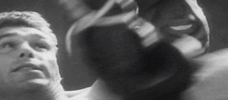
Stanley Kubrick’s Early Documentaries
1951-53 -

Fear and Desire
1953 -

Killer’s Kiss
1955 -
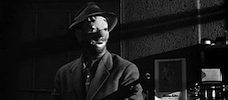
The Killing
1956 -
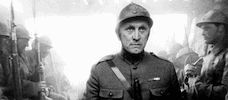
Paths of Glory
1957 -
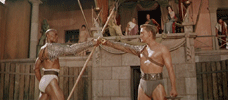
Spartacus
1960 -

Lolita
1962 -
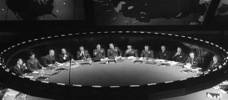
Dr. Strangelove or: How I Learned to Stop Worrying and Love the Bomb
1964 -

2001: A Space Odyssey
1968 -

A Clockwork Orange
1971 -

Barry Lyndon
1975 -

The Shining
1980 -

Full Metal Jacket
1987 -
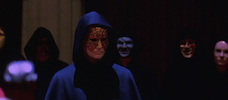
Eyes Wide Shut
1999 -

A.I.
2001
We don’t do comments anymore, but you may contact us here or find us on Twitter or Facebook.



